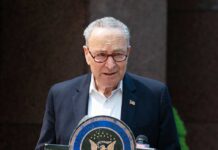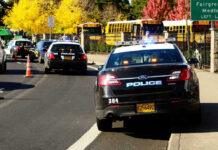
Absurd criminal charges against a DC protester for tossing a sandwich at a federal agent highlight how far past administrations stretched the law to suppress free speech and protest.
Story Snapshot
- A DC jury acquitted Sean Dunn, the “Sandwich Guy,” finding his protest gesture was not criminal assault.
- The incident occurred during a demonstration against federal law enforcement tactics in Washington, D.C.
- Federal prosecutors lost another case targeting minor acts of protest, underscoring limits of government overreach.
- The verdict is seen as a win for First Amendment protections and a rebuke to policies that criminalize dissent.
Protest, Policing, and the Boundaries of Law
On August 10, 2025, Sean Charles Dunn, a former Justice Department employee, threw a Subway sandwich at a U.S. Customs and Border Protection agent during a protest in Washington, D.C. Outside a packed club, Dunn confronted agents he called “fascists” and “racists,” tossing his sandwich in a gesture of defiance. The act, captured on video and widely shared, quickly became a national flashpoint. Prosecutors charged Dunn with misdemeanor assault, seeking to make an example of him amid heightened federal law enforcement presence in the city. The jury, after two days of deliberation, agreed the sandwich toss was a form of protest, not a crime. This outcome showcases how local communities resist attempts to criminalize minor protest actions and underscores the public’s skepticism toward federal overreach.
Federal Overreach and First Amendment Rights
The case emerged from a period when the Trump administration had deployed federal agents to Washington, D.C., aiming to restore law and order and control protests that often turned unruly. Many district residents saw the surge as an intrusion, fueling tensions between law enforcement and the activist community. Prosecutors argued that even minor acts against officers, like the sandwich toss, should be punished to deter future incidents. Yet, the jury’s decision reflected a reluctance to criminalize symbolic protest, especially when no bodily harm occurred. Dunn’s acquittal adds to a series of failed prosecutions against local residents accused of obstructing or assaulting federal officers, illustrating the limits of aggressive enforcement strategies and the strength of local juror independence.
Stakeholder Motivations and Power Dynamics
Sean Dunn, motivated by a desire to defend immigrant rights and protest perceived injustice, became a symbol for those opposing the expansion of federal policing powers. The CBP agent, Gregory Lairmore, testified about the incident, but evidence showed the sandwich was mostly intact, minimizing actual harm. The U.S. Attorney’s Office, led by Jeanine Pirro, pushed for conviction, insisting that law enforcement must be protected from assault, regardless of the severity. Activists rallied behind Dunn, viewing his actions as a legitimate exercise of free speech. The power struggle between federal prosecutors and local juries highlights a deep divide over how protest and dissent should be handled in the nation’s capital.
Dunn’s fate was ultimately decided by the jury, who balanced the need for officer safety against constitutional rights. Their verdict demonstrated that local values and interpretation of the law can prevail even in politically charged cases. The media and social networks amplified public support for Dunn, turning his story into a rallying point for critics of government overreach.
Impact and Future Implications
The acquittal brought relief to Dunn and his supporters, but came at personal cost; he lost his job at the Justice Department despite being found not guilty. For federal prosecutors, the case marks another failed attempt to secure convictions for minor protest actions, raising questions about the efficacy of aggressive charging strategies. The verdict reinforces the protest culture in D.C. and increases scrutiny of federal law enforcement tactics. Legally, it sets a precedent for distinguishing protest from assault, potentially influencing how future cases are prosecuted. Socially, the case emboldens activists and signals to government officials that the public will defend free speech rights against excessive criminalization of dissent.
Law enforcement officials warn that normalizing physical acts against officers, however minor, could undermine public safety. Legal analysts, however, note the verdict reflects a growing reluctance to treat symbolic protest as a crime when harm is absent. The debate over the boundaries between protest and assault will likely continue, but in this instance, constitutional protections prevailed over attempts to expand government control.
Sources:
Man found not guilty after throwing sandwich at federal agent in DC
DC ‘Sandwich Guy’ Acquitted: Jury Rejects Assault Charge Over CBP Confrontation
D.C. Jury Acquits ‘Sandwich Guy’ of Assaulting Federal Agent




























